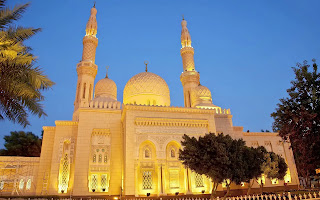Introduction
The Jumeirah Mosque is a symbol of both religious and cultural significance that can be found in the center of bustling Dubai, surrounded by contemporary architectural wonders and the city's famous skyline. Being one of the few mosques in Dubai that welcomes non-Muslim guests, it acts as a cross-cultural link in addition to being a house of worship. This article provides a thorough examination of the Jumeirah Mosque's relevance within the setting of Dubai and beyond by delving into its historical, architectural, and cultural aspects.
Historical Background
Since its 1979 opening, the Jumeirah Mosque—a relatively new addition to Dubai's architectural landscape—has come to represent the city's dedication to tolerance and diversity in culture. Dubai has always had a great regard for its history and customs, despite being a city best recognized for its quick modernization and tall skyscrapers. When the mosque was constructed, Dubai was going through a major transition that saw it move toward more interaction with the outside world while maintaining its strong Islamic tradition.
Architectural Design
**1. Design Inspiration
One magnificent example of traditional Fatimid architecture is the Jumeirah Mosque. Known for its elaborate ornamentation and unique domes, the Fatimid architectural style emerged in Egypt during the Fatimid Caliphate (909-1171 CE). The Al-Azhar Mosque in Cairo served as the model for the mosque's architecture, which combined contemporary building methods with a profound regard for traditional Islamic aesthetics.
**2. Structure and Features
The mosque is well known for its symmetrical and opulent architecture. The main prayer hall is surmounted by a massive central dome and is flanked by two minarets. Islamic art is shown by the elaborate carvings and geometric designs that adorn the minarets. Inside the mosque, a sense of grandeur and openness is created by the central dome, which is supported by a number of smaller domes.
Because the mosque's front is made of white stone, it appears glowing in the Dubai sun. The mosque's use of white stone enhances its aesthetic appeal and makes a dramatic contrast to the contemporary high-rises that surround it in addition to reflecting light. The calligraphic inscriptions and floral motifs adorning the beautifully crafted stonework give additional layers of cultural value.
**3. Interior Design
The mosque is just as magnificent inside. The intricate chandeliers and rugs in the mosque's main prayer hall add to the peaceful ambiance of the space. Verses from the Quran, beautifully illustrated in Arabic calligraphy, adorn the walls. The mosque's layout and use of light are intended to foster a contemplative and peaceful atmosphere that invites both worshippers and outside guests to partake in the place's spiritual serenity.
Cultural Significance
**1. Avenue for Interfaith Dialogue
The mosque's status as a hub for interfaith discussion is among its most noteworthy attributes. The mosque gives guided tours to non-Muslim guests as part of the "Open Doors, Open Minds" initiative, giving them the chance to learn about Islam and the mosque's architectural history. This program is a reflection of Dubai's larger efforts to promote tolerance and understanding between many religious and cultural traditions.
The visits are conducted by informed guides who share their thoughts on Islamic customs and beliefs, the mosque's architectural features, and the function of mosques in Muslim communities. In a multicultural metropolis, this program has played a significant role in debunking myths and false beliefs about Islam and fostering better cross-cultural understanding.
**2. Educational Role
The Jumeirah Mosque not only promotes interfaith harmony but also acts as a learning center for both locals and tourists. It offers a range of educational programs, such as seminars and lectures on Islamic history, art, and culture. The aforementioned programs are designed to enhance comprehension of Islamic customs and promote an increased awareness of the cultural legacy that the mosque upholds.
The Mosque and Dubai’s Modern Identity
**1. Symbol of Heritage and Modernity
A distinctive location is held by the Jumeirah Mosque in Dubai's quickly changing metropolitan environment. The mosque is a representation of Dubai's enduring reverence for its Islamic history, even though the city is well known for its cutting-edge modernism. The mosque's layout and purpose demonstrate how tradition and modernity can coexist peacefully, demonstrating the city's capacity to respect the past while looking to the future.
**2. Tourism and Cultural Exchange
Dubai's economy is heavily reliant on tourism, and the Jumeirah Mosque is a key component of this industry. The mosque adds to Dubai's standing as a major international center for cross-cultural exchange by embracing guests from all over the world and providing insights into Islamic culture. The mosque demonstrates Dubai's dedication to cultural diplomacy by interacting with foreign visitors while upholding its holy status as a house of worship.
Challenges and Future Prospects
**1. Preserving Heritage Amidst Modernization
Maintaining the historical and cultural significance of places like the Jumeirah Mosque presents constant problems as Dubai develops. Careful planning and a dedication to preserving the mosque's architectural and cultural value are necessary to strike a balance between modernity and heritage preservation. The mosque's significance as a religious and cultural icon needs to be preserved in the face of the city's quick expansion.
**2. Expanding Educational and Interfaith Initiatives
Future plans call for extending the mosque's interfaith and educational programs. The mosque may do more to strengthen its position as a hub for discussion and education by creating new initiatives and collaborations. To encourage more understanding and cooperation, this could entail working with educational institutions, cultural organizations, and religious groups.
Conclusion
Dubai's rich cultural legacy and dedication to promoting international understanding are demonstrated by the Jumeirah Mosque. It is a noteworthy landmark in a city renowned for its rapid growth and modernity because of its architectural beauty, historical relevance, and role in fostering intercultural understanding. The Jumeirah Mosque will surely continue to stand as a testament to Dubai's unwavering respect for heritage and its commitment to uniting cultures through openness and education as it navigates the challenges of modernization.

